Jiajun Chen
E2PL: Effective and Efficient Prompt Learning for Incomplete Multi-view Multi-Label Class Incremental Learning
Jan 23, 2026Abstract:Multi-view multi-label classification (MvMLC) is indispensable for modern web applications aggregating information from diverse sources. However, real-world web-scale settings are rife with missing views and continuously emerging classes, which pose significant obstacles to robust learning. Prevailing methods are ill-equipped for this reality, as they either lack adaptability to new classes or incur exponential parameter growth when handling all possible missing-view patterns, severely limiting their scalability in web environments. To systematically address this gap, we formally introduce a novel task, termed \emph{incomplete multi-view multi-label class incremental learning} (IMvMLCIL), which requires models to simultaneously address heterogeneous missing views and dynamic class expansion. To tackle this task, we propose \textsf{E2PL}, an Effective and Efficient Prompt Learning framework for IMvMLCIL. \textsf{E2PL} unifies two novel prompt designs: \emph{task-tailored prompts} for class-incremental adaptation and \emph{missing-aware prompts} for the flexible integration of arbitrary view-missing scenarios. To fundamentally address the exponential parameter explosion inherent in missing-aware prompts, we devise an \emph{efficient prototype tensorization} module, which leverages atomic tensor decomposition to elegantly reduce the prompt parameter complexity from exponential to linear w.r.t. the number of views. We further incorporate a \emph{dynamic contrastive learning} strategy explicitly model the complex dependencies among diverse missing-view patterns, thus enhancing the model's robustness. Extensive experiments on three benchmarks demonstrate that \textsf{E2PL} consistently outperforms state-of-the-art methods in both effectiveness and efficiency. The codes and datasets are available at https://anonymous.4open.science/r/code-for-E2PL.
DeTracker: Motion-decoupled Vehicle Detection and Tracking in Unstabilized Satellite Videos
Jan 14, 2026Abstract:Satellite videos provide continuous observations of surface dynamics but pose significant challenges for multi-object tracking (MOT), especially under unstabilized conditions where platform jitter and the weak appearance of tiny objects jointly degrade tracking performance. To address this problem, we propose DeTracker, a joint detection-and-tracking framework tailored for unstabilized satellite videos. DeTracker introduces a Global--Local Motion Decoupling (GLMD) module that explicitly separates satellite platform motion from true object motion through global alignment and local refinement, leading to improved trajectory stability and motion estimation accuracy. In addition, a Temporal Dependency Feature Pyramid (TDFP) module is developed to perform cross-frame temporal feature fusion, enhancing the continuity and discriminability of tiny-object representations. We further construct a new benchmark dataset, SDM-Car-SU, which simulates multi-directional and multi-speed platform motions to enable systematic evaluation of tracking robustness under varying motion perturbations. Extensive experiments on both simulated and real unstabilized satellite videos demonstrate that DeTracker significantly outperforms existing methods, achieving 61.1% MOTA on SDM-Car-SU and 47.3% MOTA on real satellite video data.
PROMISE: Prompt-Attentive Hierarchical Contrastive Learning for Robust Cross-Modal Representation with Missing Modalities
Nov 14, 2025Abstract:Multimodal models integrating natural language and visual information have substantially improved generalization of representation models. However, their effectiveness significantly declines in real-world situations where certain modalities are missing or unavailable. This degradation primarily stems from inconsistent representation learning between complete multimodal data and incomplete modality scenarios. Existing approaches typically address missing modalities through relatively simplistic generation methods, yet these approaches fail to adequately preserve cross-modal consistency, leading to suboptimal performance. To overcome this limitation, we propose a novel multimodal framework named PROMISE, a PROMpting-Attentive HIerarchical ContraStive LEarning approach designed explicitly for robust cross-modal representation under conditions of missing modalities. Specifically, PROMISE innovatively incorporates multimodal prompt learning into a hierarchical contrastive learning framework, equipped with a specially designed prompt-attention mechanism. This mechanism dynamically generates robust and consistent representations for scenarios where particular modalities are absent, thereby effectively bridging the representational gap between complete and incomplete data. Extensive experiments conducted on benchmark datasets, along with comprehensive ablation studies, clearly demonstrate the superior performance of PROMISE compared to current state-of-the-art multimodal methods.
How does Alignment Enhance LLMs' Multilingual Capabilities? A Language Neurons Perspective
May 27, 2025Abstract:Multilingual Alignment is an effective and representative paradigm to enhance LLMs' multilingual capabilities, which transfers the capabilities from the high-resource languages to the low-resource languages. Meanwhile, some researches on language-specific neurons reveal that there are language-specific neurons that are selectively activated in LLMs when processing different languages. This provides a new perspective to analyze and understand LLMs' mechanisms more specifically in multilingual scenarios. In this work, we propose a new finer-grained neuron identification algorithm, which detects language neurons~(including language-specific neurons and language-related neurons) and language-agnostic neurons. Furthermore, based on the distributional characteristics of different types of neurons, we divide the LLMs' internal process for multilingual inference into four parts: (1) multilingual understanding, (2) shared semantic space reasoning, (3) multilingual output space transformation, and (4) vocabulary space outputting. Additionally, we systematically analyze the models before and after alignment with a focus on different types of neurons. We also analyze the phenomenon of ''Spontaneous Multilingual Alignment''. Overall, our work conducts a comprehensive investigation based on different types of neurons, providing empirical results and valuable insights for better understanding multilingual alignment and multilingual capabilities of LLMs.
PATS: Process-Level Adaptive Thinking Mode Switching
May 25, 2025Abstract:Current large-language models (LLMs) typically adopt a fixed reasoning strategy, either simple or complex, for all questions, regardless of their difficulty. This neglect of variation in task and reasoning process complexity leads to an imbalance between performance and efficiency. Existing methods attempt to implement training-free fast-slow thinking system switching to handle problems of varying difficulty, but are limited by coarse-grained solution-level strategy adjustments. To address this issue, we propose a novel reasoning paradigm: Process-Level Adaptive Thinking Mode Switching (PATS), which enables LLMs to dynamically adjust their reasoning strategy based on the difficulty of each step, optimizing the balance between accuracy and computational efficiency. Our approach integrates Process Reward Models (PRMs) with Beam Search, incorporating progressive mode switching and bad-step penalty mechanisms. Experiments on diverse mathematical benchmarks demonstrate that our methodology achieves high accuracy while maintaining moderate token usage. This study emphasizes the significance of process-level, difficulty-aware reasoning strategy adaptation, offering valuable insights into efficient inference for LLMs.
Internal Bias in Reasoning Models leads to Overthinking
May 22, 2025Abstract:While current reasoning models possess strong exploratory capabilities, they are often criticized for overthinking due to redundant and unnecessary reflections. In this work, we reveal for the first time that overthinking in reasoning models may stem from their internal bias towards input texts. Upon encountering a reasoning problem, the model immediately forms a preliminary guess about the answer, which we term as an internal bias since it is not derived through actual reasoning. When this guess conflicts with its reasoning result, the model tends to engage in reflection, leading to the waste of computational resources. Through further interpretability experiments, we find that this behavior is largely driven by the model's excessive attention to the input section, which amplifies the influence of internal bias on its decision-making process. Additionally, by masking out the original input section, the affect of internal bias can be effectively alleviated and the reasoning length could be reduced by 31%-53% across different complex reasoning tasks. Notably, in most cases, this approach also leads to improvements in accuracy. These findings demonstrate a causal relationship between internal bias and overthinking.
Why Not Act on What You Know? Unleashing Safety Potential of LLMs via Self-Aware Guard Enhancement
May 17, 2025Abstract:Large Language Models (LLMs) have shown impressive capabilities across various tasks but remain vulnerable to meticulously crafted jailbreak attacks. In this paper, we identify a critical safety gap: while LLMs are adept at detecting jailbreak prompts, they often produce unsafe responses when directly processing these inputs. Inspired by this insight, we propose SAGE (Self-Aware Guard Enhancement), a training-free defense strategy designed to align LLMs' strong safety discrimination performance with their relatively weaker safety generation ability. SAGE consists of two core components: a Discriminative Analysis Module and a Discriminative Response Module, enhancing resilience against sophisticated jailbreak attempts through flexible safety discrimination instructions. Extensive experiments demonstrate SAGE's effectiveness and robustness across various open-source and closed-source LLMs of different sizes and architectures, achieving an average 99% defense success rate against numerous complex and covert jailbreak methods while maintaining helpfulness on general benchmarks. We further conduct mechanistic interpretability analysis through hidden states and attention distributions, revealing the underlying mechanisms of this detection-generation discrepancy. Our work thus contributes to developing future LLMs with coherent safety awareness and generation behavior. Our code and datasets are publicly available at https://github.com/NJUNLP/SAGE.
Trans-Zero: Self-Play Incentivizes Large Language Models for Multilingual Translation Without Parallel Data
Apr 20, 2025Abstract:The rise of Large Language Models (LLMs) has reshaped machine translation (MT), but multilingual MT still relies heavily on parallel data for supervised fine-tuning (SFT), facing challenges like data scarcity for low-resource languages and catastrophic forgetting. To address these issues, we propose TRANS-ZERO, a self-play framework that leverages only monolingual data and the intrinsic multilingual knowledge of LLM. TRANS-ZERO combines Genetic Monte-Carlo Tree Search (G-MCTS) with preference optimization, achieving strong translation performance that rivals supervised methods. Experiments demonstrate that this approach not only matches the performance of models trained on large-scale parallel data but also excels in non-English translation directions. Further analysis reveals that G-MCTS itself significantly enhances translation quality by exploring semantically consistent candidates through iterative translations, providing a robust foundation for the framework's succuss.
Understanding LLMs' Cross-Lingual Context Retrieval: How Good It Is And Where It Comes From
Apr 15, 2025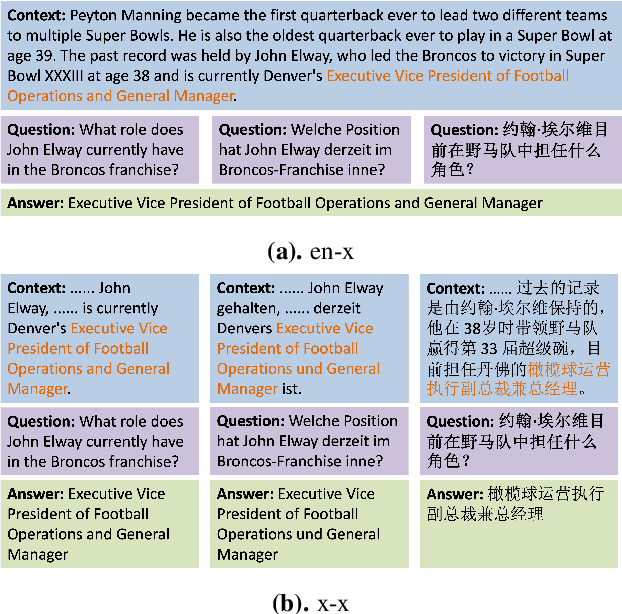
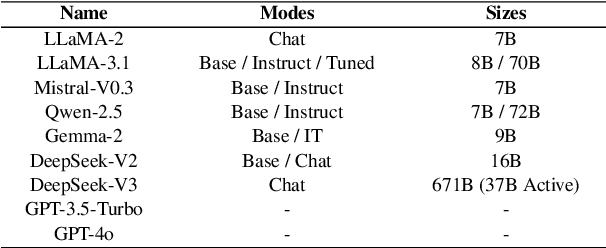
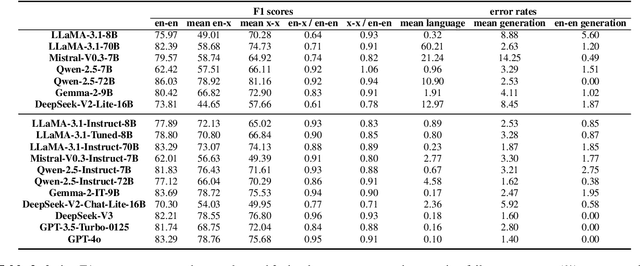
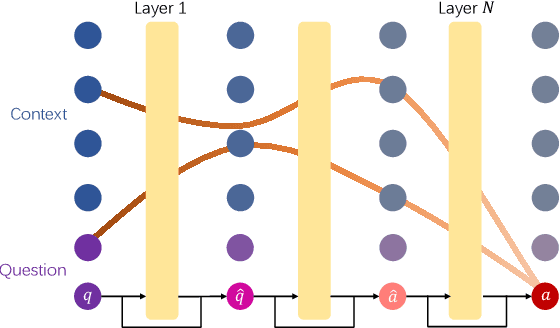
Abstract:The ability of cross-lingual context retrieval is a fundamental aspect of cross-lingual alignment of large language models (LLMs), where the model extracts context information in one language based on requests in another language. Despite its importance in real-life applications, this ability has not been adequately investigated for state-of-the-art models. In this paper, we evaluate the cross-lingual context retrieval ability of over 40 LLMs across 12 languages to understand the source of this ability, using cross-lingual machine reading comprehension (xMRC) as a representative scenario. Our results show that several small, post-trained open LLMs show strong cross-lingual context retrieval ability, comparable to closed-source LLMs such as GPT-4o, and their estimated oracle performances greatly improve after post-training. Our interpretability analysis shows that the cross-lingual context retrieval process can be divided into two main phases: question encoding and answer retrieval, which are formed in pre-training and post-training, respectively. The phasing stability correlates with xMRC performance, and the xMRC bottleneck lies at the last model layers in the second phase, where the effect of post-training can be evidently observed. Our results also indicate that larger-scale pretraining cannot improve the xMRC performance. Instead, larger LLMs need further multilingual post-training to fully unlock their cross-lingual context retrieval potential. Our code and is available at https://github.com/NJUNLP/Cross-Lingual-Context-Retrieval
FamilyTool: A Multi-hop Personalized Tool Use Benchmark
Apr 09, 2025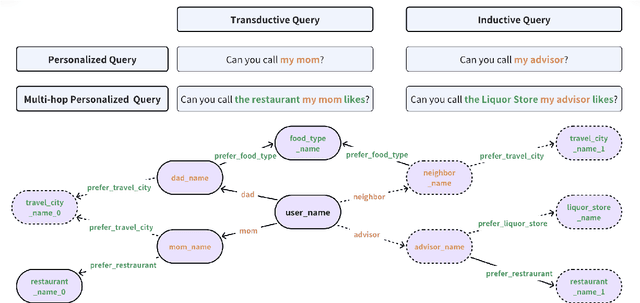

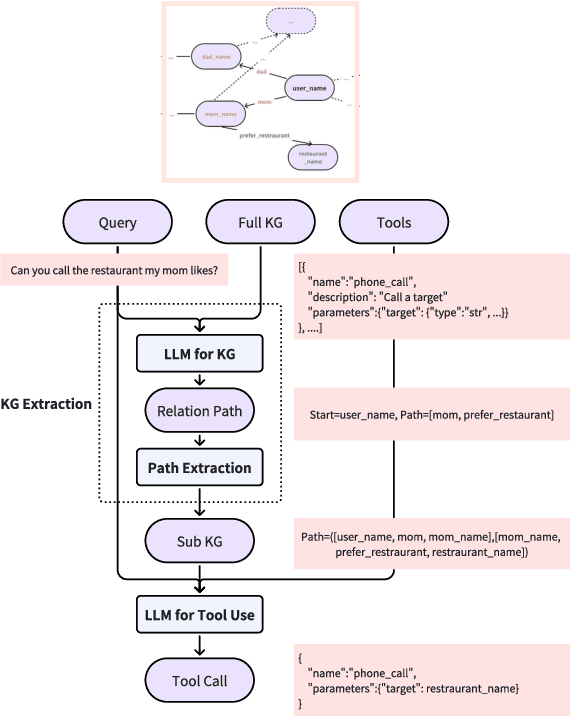
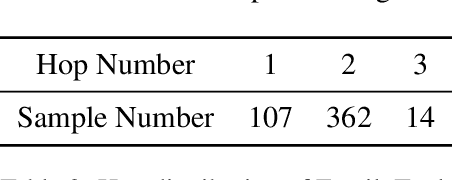
Abstract:The integration of tool learning with Large Language Models (LLMs) has expanded their capabilities in handling complex tasks by leveraging external tools. However, existing benchmarks for tool learning inadequately address critical real-world personalized scenarios, particularly those requiring multi-hop reasoning and inductive knowledge adaptation in dynamic environments. To bridge this gap, we introduce FamilyTool, a novel benchmark grounded in a family-based knowledge graph (KG) that simulates personalized, multi-hop tool use scenarios. FamilyTool challenges LLMs with queries spanning 1 to 3 relational hops (e.g., inferring familial connections and preferences) and incorporates an inductive KG setting where models must adapt to unseen user preferences and relationships without re-training, a common limitation in prior approaches that compromises generalization. We further propose KGETool: a simple KG-augmented evaluation pipeline to systematically assess LLMs' tool use ability in these settings. Experiments reveal significant performance gaps in state-of-the-art LLMs, with accuracy dropping sharply as hop complexity increases and inductive scenarios exposing severe generalization deficits. These findings underscore the limitations of current LLMs in handling personalized, evolving real-world contexts and highlight the urgent need for advancements in tool-learning frameworks. FamilyTool serves as a critical resource for evaluating and advancing LLM agents' reasoning, adaptability, and scalability in complex, dynamic environments. Code and dataset are available at Github.
 Add to Chrome
Add to Chrome Add to Firefox
Add to Firefox Add to Edge
Add to Edge